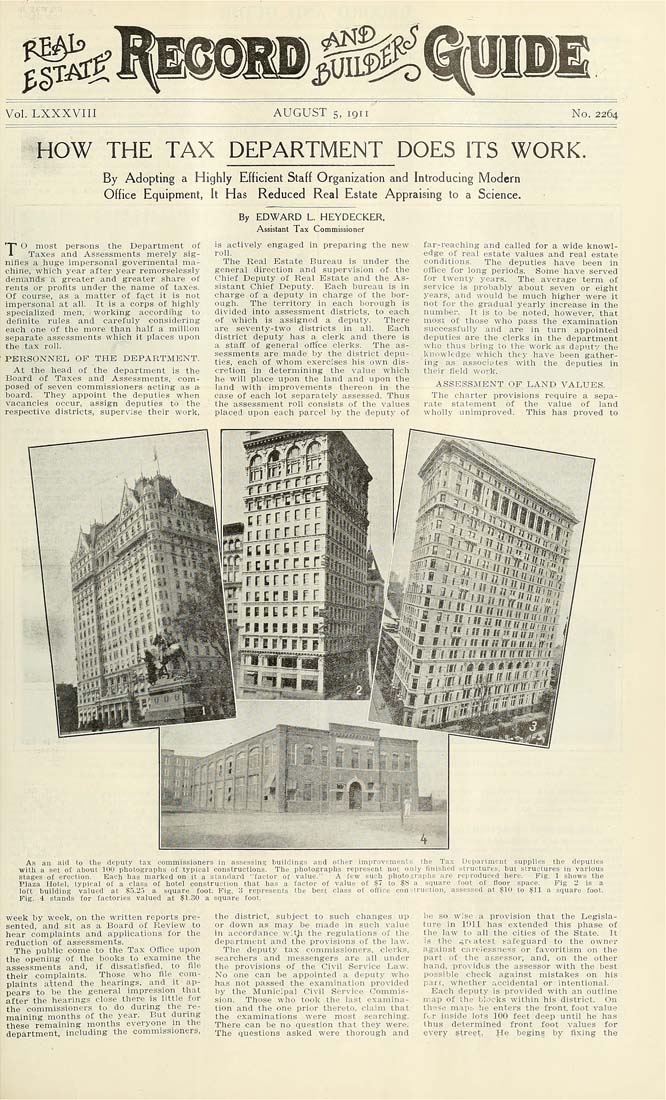Please note: this text may be incomplete. For more information about this OCR, view
About OCR text.
m^,
VoL LXXXVIII
AUGUST 5, iQii
No. 2264
HOW THE TAX DEPARTMENT DOES ITS WORK.
By Adopting a Highly Efficient Staff Organization and Introducing Modern
Office Equipment, It Has Reduced Real Estate Appraising to a Science.
To most persons the Department of
Taxes and Assessments merely sig¬
nifies a huge impersonal govermental ma¬
chine, which year after year remorselessly
demands a greater and greater share of
rents or profits under the name of taxes.
Of course, as a matter of ti^ct it is not
impersonal at all. It is a corps of highly
specialized men. working accordiiig to
definite rules and carefuly considering
each one of the more than half a million
separate assessments which it places upon
the tax roll.
PERSONNEL OF THE DEPARTMENT.
At the head of the department is the
Board of Taxes and Assessments, com¬
posed of seven commissioners acting as a-
hoard. They appoint the deputies when
vacancies occur, assign deputies to the
respective districts, supervise their worlt,
By EDWARD L. HEYDECKER,
Assistant Tax Commissioner
is actively engaged in preparing the new
roll.
The Real Estate Bureau is under the
general direction and supervision of the
Chief Deputy of Real Estate and the As-
si.stant Chief Deputy. Each bureau is in
charge of a deputy in charge of the bor-
ougli. The territory in each borough is
divided into assessment districts, to each
of which is assigned a deputy. There
are seventy-two districts in all. Each
district deputy has a clerk and there is
a staff of general ofiice clerks. The as¬
sessments are made by the district depu¬
ties, each of whom exercises his own dis¬
cretion in determining the value which
he will place upon the land and upon the
land with improvements thereon in the
case of each lot separately assessed. Thus
the assessment roll consists of the values
placed upon each parcel hy the deputy of
far-reaching and called for a wide knowl¬
edge of real estate values and real estate
conditions. The deputies have heen in
ofiice for long periods. Some have served
for twenty years. The average term of
service is probably about seven or eight
years, and would be much higher were it
not for the gradual yearly increase in tlie
number. Tt is to be noted, however, that
most of those who pass the examination
successfully and are in turn appointed
deputies are the clerks in the department
wlio thus bring to the work as dsputy the
knowledge which tliey have been gather¬
ing as associates with the deputies in
their field work.
ASSESSMENT OF LAND VALUES.
The charter provisions require a sepa¬
rate statement of the value of land
wholly unimproved. This has proved to
As an aid to the deputy tax commissioners in assessing buildings and other improvements the Tax DeparLhient supplies the deputies
with a set of atiout KIO photographs o£ typical constructions. Tlie photographs represent not only finished structures, hut structures in various
stages o£ erection. Baeli has marked on it a standard "factor of value." A few such photographs are reproduced here. Fig. 1 shows the
Plaza Hotel, typical of a class of hotel construction that lias a lactor of value of JfT to ?S a square foot ol floor space. Fig 2 is a
loCt huilding valued at ^5.'2a a square fool. Fig. 3 represents tbo best class of oflice conslruclion, assessed at IflO fo IfU a square fool.
Fig. 4 stands for factories valued at .^1.30 a square foot.
week by week, on the written reports pre¬
sented, and sit as a Board of Review to
hear complaints and applications for the
reduction of assessments.
The public come to the Tax Office upon
the opening of the books to examine the
assessments and, if dissatisfied, to file
their complaints. Those who file com¬
plaints attend the hearings, and it ap¬
pears to be the general impression that
after the hearings close there is little for
the commissioners to do during the re¬
maining months of the year. But during
these remaining months everyone m the
department, including the commissioners,
the district, subject to such changes up
or down as may be made in such value
in accordance wltji the regulations of the
department and the provisions of the law.
The deiJuty tax comniissioners, clerks,
searchers and messengers arc all under
the provisions of the Civil Service Law.
No one can be appointed a deputy who
has not passed the examination provided
by the Municipal Civil Service Commis¬
sion. Those who took the last examina¬
tion and the one prior thereto, claim that
the examinations were most searching.
There can be no question that they were.
The questions asked were thorough and
be so wise a provision that the Legisla¬
ture in 1911 has extended this phase of
the law to all the cities of the State. It
is tho .;rtatest safeguard to the owner
against carelessness or favoritism on the
part of the assesso)', and, on the other
hand, provides the assessor with the best
possible check against mistakes on his
part, whether accidental or intentional.
Each deputy is provided with an outline
map of the blocks within his district. On
lh'^5,3 maps he enters the front foot value
ft.r inside lots IOO feet deep until he has
thus determined front foot values for
every street, He begins by fixing the








